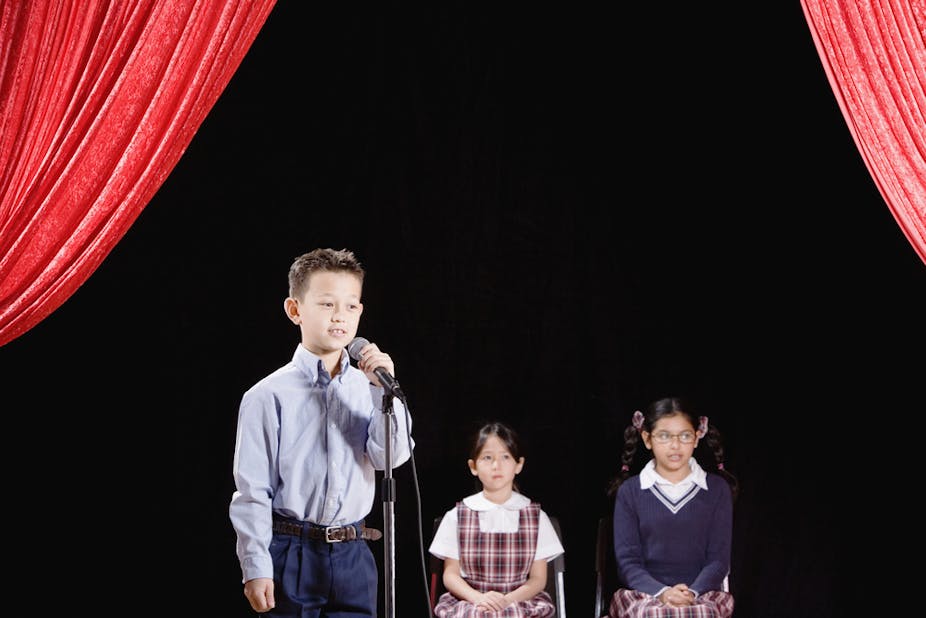Channel Ten’s newly announced show, The Great Australian Spelling Bee, may seem like a great platform for promoting literacy skills. Ten promises to inspire and excite audiences, while celebrating a love for words, spelling, and grammar.
The show will be a competition between precocious 8- to 13-year-olds spelling increasingly difficult words out-loud in a high-pressure, high-anxiety environment. If the US National Spelling Bee is anything to go by, the difference between winners and losers will be spelling words we wouldn’t dream of attempting.
How would you go spelling feuilleton, stichomythia, cymotrichous, or appoggiatura? More importantly, do you know the meaning of these words, and could you use them in a sentence?
Challenging and insightful, or obscure and essentially pointless? Spelling bees encourage endless memorisation of complex but low-frequency words – and are a distraction from the core of literacy education.
An American tradition
America has a strong tradition of spelling bees, starting in 1925 when a group of newspapers sponsored the competition. Since then, the Scripps National Spelling Bee has held increasingly cut-throat competitions every year.
With ESPN covering the last 21 spelling bees, Americans can watch the brightest young spellers every year.
Holding a televised bee may spark a similar hype for literacy and the English language in Australia. But what does this style of competition say about literacy?

Promoting the wrong literacy skills
The Scripps National Spelling Bee involves some vocabulary questions in the earlier rounds, but the focus remains on the oral spelling of increasingly obscure words. Successful competitors learn strategies like using common root words, word origins, and their likely spelling patterns. However, they need repetitive and deliberate practice to win. Essentially, the kids have to memorise hundreds if not thousands of words.
Providing the spelling of words, like matching words to their meanings in multiple choice questions, are low-order learning outcomes. These are known as uni-structural, and require only the connection of one piece of information with another. This contrasts with learning outcomes that require describing or sequencing information, explaining ideas, and problem solving.
Being able to spell difficult words is only one element needed to become a literate learner. Australia’s National Inquiry into the Teaching of Literacy found that phonics (teaching the sound-letter patterns needed to read and spell) is an important component of literacy instruction. However, effective instruction should also include phonemic awareness (knowledge of how sounds make up words), fluency (the ability to read smoothly, quickly, and accurately), vocabulary knowledge, and text comprehension.
Literacy teaching does involve repetitive practice to master the code, but this is merely a means to an end. In later years, students learn much of their advanced vocabulary from reading. Teachers may also provide explicit instruction in vocabulary around particular topics. At more advanced levels, students should learn words according to their meaning and function, as well as their spelling.
Spelling bees are as useful as speed reading races. What is the point of speed if you haven’t understood what you’ve read?
Education is more than memorisation
Just like the repetitive practice needed for spelling bees, some products claim that their daily “brain exercises” will improve cognitive function. The growing market of brain training games and apps reflects the proliferation of pseudoscience to create and exploit new markets.
Lumosity uses the analogy of physical exercise to explain how practising daily “neuropsychological tasks” can improve your “mental fitness”. Some studies do show that repeated practice on brain training will improve performance on those particular tasks. But there is no evidence that this makes changes to brain function in the real world, so what is the point?
Teachers do not drill students to regurgitate rote-learnt information. Education is a process that involves the exchange and negotiation of meaning. While practice is important for mastering underlying skills, learning should not be promoted as a form of fitness, because education is not like working out.
What about kids with learning difficulties?
Spelling bees can dishearten kids who struggle with spelling. Students with specific learning difficulties, like language impairment and dyslexia, struggle to master the spelling and reading of words at a much more fundamental level.
However, if a student’s only difficulty is poor spelling that is hardly a barrier to their academic or professional success. Recent research has shown the potential for technology to compensate for such difficulties. We all use spellcheck on a daily basis to help us spell low frequency words.
Difficulty reading or spelling certainly hasn’t impeded the success of Richard Branson or Whoopi Goldberg, who both have dyslexia.
Spend more time reading and writing stories
If the show lives up to its promise to:
… supersize spelling into a hyper-stylised, entertainment family event
Ten’s The Great Australian Spelling Bee will attempt to make education entertaining, by missing the point altogether.
The purpose of literacy and education is to access and create meaning, not to endlessly memorise spellings or facts. Studying for spelling bees wastes time better spent on real-world tasks like reading literature, writing stories, or debating ideas.
After all, what is the point of me spelling the word “insouciant”, if I don’t know what it means and thus can’t use it to express my indifference to these competitions?

